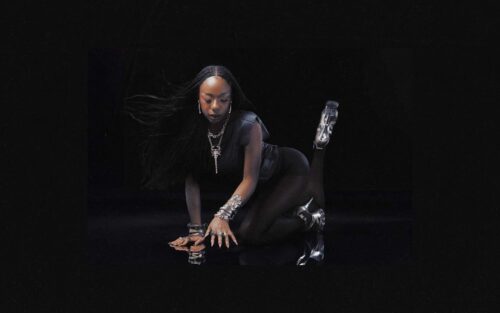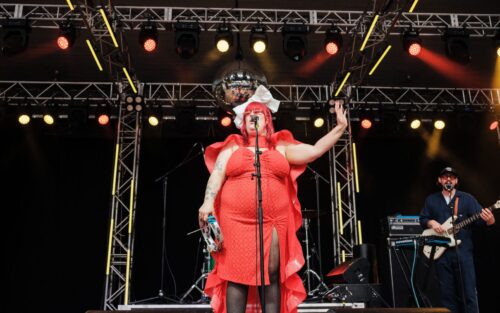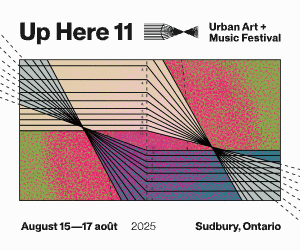The Health Condition That Almost Kept Dana Gavanski From Singing
The rising indie-folk songwriter learns to accept the uncertainty of life with new album, When It Comes.
By Gregory Adams
Photo by Clementine Schneidermann
- Published on
Though Dana Gavanski is quite affable and relaxed while discussing the details of When It Comes, her sophomore collection of idiosyncratic art-pop, it wasn’t too long ago that conversation had been a literal pain for the South London-based musician. Back in the summer of 2020 – mere months after the release of her debut album, Yesterday Is Gone — the singer-songwriter was experiencing unusual discomfort in her throat, which noticeably affected her voice on various fronts. “It was painful to speak. I had a hard time talking for very long without feeling pain,” she reveals to RANGE. “I could still sing high and everything, though with [that] pain I avoided it. I had to force myself to be silent. It was really hard to do—it’s surprisingly hard to not talk.”
At first, Gavanski contemplated whether this was a returning bout of tonsillitis. Eventually, a nasal endoscopy uncovered that Gavanski been suffering from extreme acid reflux, with doctors suggesting she cut out acidic foods and unlearn the second nature act of clearing one’s throat as ways to ease the pain. Later, she’d undergo deep massage physiotherapy on her vocal cords (“I would not wish that on anyone”). Despite this, she never gave up on music.
“It exposed how hard-headed I was, because I wanted to make a record,” Gavanski recalls of the slow-but-steady path to When It Comes. “I didn’t want to think about my voice, or my diet. I already felt overwhelmed by everything; I just wanted to be able to make some music.”
The album title doesn’t just encompass Gavanski’s vocal challenges; its name is taken from a track ultimately cut from the collection, but it does hint at how she learned to accept that sometimes her voice would be ready to songbird, and other times would need to stay grounded. And it’s ok to work within those constraints.
“There’s this overarching theme of accepting myself, and what I can do,” she explains of the album, writ large. “It’s just letting things come to me, rather than feeling like I need to overcontrol and forcefully create something. That’s something I’ve been trying to do more of.”
As it turns out, it took time for music making to come naturally to Gavanski. Though she started playing guitar while she was growing up in Vancouver, she became overwhelmed with how to approach the instrument beyond strumming Joan Baez’s “Diamonds and Rust” (“It was the one song I could play for years. My grandmother would be like, ‘Sing Diamonds and Rust’ with this heavy accent…I started to really hate that song.”) Years later, following a move to Montreal, she picked up the instrument again after an ex had left a guitar at her place. Inspired by Joni Mitchell and 60s English folk, Gavanski began experimenting with alternate tunings and started playing cafés around Montreal. This led her to track her first EP: 2019’s Spring Demos.


Though Gavanski relocated to South London’s New Cross neighbourhood at the end of 2019, Montreal still looms large on When It Comes. Opening piano bop “I Kiss the Night” was written during a brief return to the city where she was cat-sitting for a friend while renewing her work visa. The tune is aglow with walking basslines, soul-chiming bells, and soft-shushed vocal melodies about basking in the beauty of moonlight. “I do like the mysteriousness of the night, and I like how silent it is,” she says of her nocturnal muse. “When it’s daytime, I’m surrounded by people and things; my mind is a little more easily distracted.”
The focus of When It Comes, meanwhile, shifted throughout the writing process. Early on, Gavanski had contemplated theming the album around the four seasons, though she mostly backed off on the concept. Still, spacious acoustic strums and a jaunty parlor piano set the mood for the yearning, August-balmy “Letting Go,” (“the summer’s almost gone/I never liked it anyway”); the playful staccato slamming of “Indigo Highway” acts a fond, if esoteric, recollection of summer road trips between Vancouver and Southern California timeshares with a childhood friend. Elsewhere, the warped undulations of “The Day Unfolds” contort around lines about “snow falling bright.” “Living in most places in Canada, you have these very defined seasons—and you long for them,” Gavanski suggests. “With winter, I really like it when there’s lots of snow. It’s hard to go to work and get around, but it’s just so beautiful.”
With When It Comes, Gavanski learned how to be “ok with the uncertainty” of life. When confronted with a loss of voice, she persevered by knowing when to strike and when to rest. As a favourite season passes by, there is nevertheless comfort in its eventual return. That spirit courses into album finale “Knowing to Trust,” a midnight hazy whirl of psychedelic organs which suggests sometimes you need to ride things out rather than worry about the endgame. Nature inevitably finds a way.
As Gavanski sums it up: “It was my attempt to go a little bit beyond myself while feeling part of everything.”
By Sebastian Buzzalino
Calgary’s beloved summer festival trudges through the downpour with a stacked lineup of genre-bending greatness.
By Megan Magdalena
Rebecca White of Vancouver punk act WAIT//LESS interviews frontwoman Missy Dabice in a backstage catharsis session.













